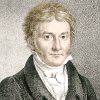Top 3 Mathematicians
Leonhard Euler
Leonhard Euler was an 18th century physicist and scholar who was responsible for developing many concepts that are an integral part of modern mathematics.
Revolutionary Principles
Over his career, Euler came up with an array of principles which laid the foundation for much of modern mathematics as we know it. He was a revolutionary thinker in the fields of geometry, trigonometry, calculus, differential equations, number theory and notational systems—including the utilization of π and f(x)—among a legion of other accomplishments. His Euler's Identity theorem is often cited as the most delightful of equations and his work also focused on the fields of astronomy/lunar motion, acoustics, mechanics and music.
Euler was a highly prolific author, having written hundreds of papers and publications over his lifetime, including the well-known science and philosophy series Letters to a German Princess.
Contributions :-
Euler found the lovely equation: Σn p(n) xn = 1 / Πk (1 - xk)
Euler's Polyhedral Theorem, F+V = E+2 (although it may have been discovered by Descartes and first proved rigorously by Jordan)
ei x = cos x + i sin x. (It is almost wondrous how the particular instance ei π+1 = 0 combines the most important constants and operators together.)
Carl Friedrich Gauss
Carl Friedrich Gauss, the "Prince of Mathematics," exhibited his calculative powers when he corrected his father's arithmetic before the age of three. His revolutionary nature was demonstrated at age twelve, when he began questioning the axioms of Euclid.
Gauss once wrote "It is not knowledge, but the act of learning, ... which grants the greatest enjoyment. When I have clarified and exhausted a subject, then I turn away from it, in order to go into darkness again ..."
Number Theory
In his time as a student, Gauss made many momentous discoveries in number theory, such as the one above.
Number theory was his favorite field. Later, he would famously say:
 “Mathematics is the queen of sciences and number theory is the queen of mathematics.”
“Mathematics is the queen of sciences and number theory is the queen of mathematics.”
CARL FRIEDRICH GAUSS
Gauss zum Gedächtniss, 1856
Contributions :-
Gauss built the theory of complex numbers into its modern form, including the notion of "monogenic" functions which are now ubiquitous in mathematical physics.
Gauss developed the arithmetic of congruences and became the premier number theoretician of all time.
Other contributions of Gauss include hypergeometric series, foundations of statistics, and differential geometry. He proved a surprising fundamental theorem about the curvature of manifolds. He also did important work in geometry.
3
G. F. Bernhard Riemann
Riemann was a phenomenal genius whose work was exceptionally deep, creative and rigorous; he made revolutionary contributions in many areas of pure mathematics, and also inspired the development of physics. He had poor physical health and died at an early age, yet is still considered to be among the most productive mathematicians ever. He made revolutionary advances in complex analysis, which he connected to both topology and number theory.
Contributions to the Field of Mathematics
Riemann was pure genius and his phenomenal contributions to the Mathematical world are a proof of his creativity and depth of knowledge. Despite his ailing health he was one of the greatest mathematicians of all time. He had an extraordinary command over complex analysis which he interconnected with topology and number theory. Other revolutionary contributions include the tensor analysis, theory of functions, differential geometry and the most notable being the theory of manifolds. His work in geometry defined new probabilities by generalizing the notions of distance and curvature. Many theorems are named after him for example the Reimann-Roch theorem. He pursued general actuality proofs, rather than constructive proofs that actually produce the objects. He said that this method led to theoretical clarity, making it easy for the mathematician and avoided getting confused with too much detail. He was an outstanding and genuine mathematician. Even many principles of modern physics rely on Reimann’s notions of the geometry of space. The base of Einstein’s Theory of Relativity was set up in 1854 when Riemann gave his first lectures.
He developed the theory of manifolds, a term which he invented. Manifolds underpin topology.
Riemann's other masterpieces include tensor analysis, the theory of functions, and a key relationship between some differential equation solutions and hypergeometric series.
However modern physics, beginning with Einstein's relativity, relies on Riemann's curvature tensor and other notions of the geometry of space.



Comments
Post a Comment